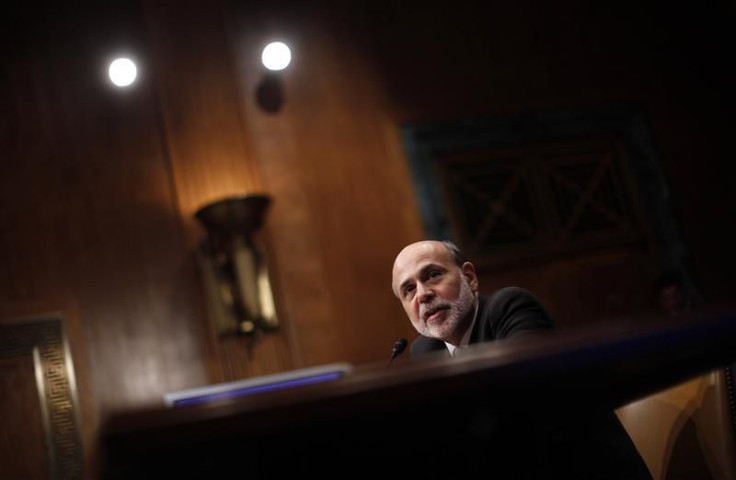Ahead of Bernanke's Jackson Hole Speech, Anticipation and Disappointment

Market-watchers continued to use words like "anticipation," "expectations," "disappointment" and "excitement" Thursday, less than 24 hours ahead of a speech by Federal Reserve Chairman Ben Bernanke that is being hyped up as a make-or-break moment for economic affairs in 2012.
In the absence of major developments elsewhere in the world of high finance over the past two weeks, the experts have appropriated the language of hormonal teenagers gossiping about who asked who out to the prom, building up Bernanke's speech at a regional Fed conference in Jackson Hole, Wyo., as likely to be a cross between the Gettysburg address, the Sermon on the Mount and Halie Selassie's 1936 Address to the U.N.
"Recognizing that it is difficult to forecast free-form speeches," Goldman Sachs analysts wrote Tuesday before attempting to forecast the contents of Bernanke's speech, noting "Bernanke's title "Monetary Policy Since the Crisis" suggests that he might take a broad "lessons learned" approach."
The Goldman analysts, who do not believe the speech will open the door for a new round of asset purchases, say the speech will nonetheless "be consistent with a high probability that Fed officials will ease monetary policy further" and could even "open the door to "unconventional unconventional" easing," like nominal GDP or output targeting.
Credit Suisse's foreign exchange strategists were somewhat less hedged on a note also out Tuesday, noting that "regardless of our wistful memories of the Chairman coming to the rescue in Wyoming, history shows us that whatever expectations may be, the speech often ends in a sell-off" and suggesting investors sell short medium-term U.S. Treasuries ahead of the speech.
The tepid assessments of what Chairman Bernanke might say or do Friday come in stark contrast to action in the financial markets, where according to the Treasuries research group at Barclays Capital, a run-up in bond prices has been seen "likely as markets began to price in some expectations ahead of Chairman Bernanke's Jackson Hole speech."
The benchmark S&P 500 Index of U.S. stocks, on the other hand, while down from multiyear highs of 1,426.68 earlier this month, was still trading in a narrow band between 1,400 and 1,420, suggesting investors were not pricing in the disappointment analysts were talking about.
Risky currencies were also rallying as a record number of bets were made on euro, suggesting a high degree of confidence on further Fed easing and later action from European leadership.
Indeed, the excitement of the Jackson Hole guessing game seemed to have bubbled over to analysts now trying to guess the actions of central bankers beyond, specifically, at ECB and Federal Reserve meetings in early September. UBS analysts, which said in a note last Friday that they expected Bernanke to "explain what mechanisms the Fed would use to ease further but avoid promising that further easing will be forthcoming," noted the Sept. 7 August payrolls report would be the most significant datapoint in helping predict future Fed action.
Further muddying the waters have been two August staff reports from Federal Reserve economists which, using various economic arguments, seem to have provided ammunition to those arguing against further monetary stimulus. First, a report by the New York Fed staff found about a third of the excess unemployment currently seen in the U.S. is structural, caused by "misalignment ... idle workers are seeking employment in sectors (occupations, industries, locations) different from those where the available jobs are."
Another, more recent report by the staff at the Dallas Fed, took an in-depth look at the "unintended consequences" of extraordinarily accommodating monetary policy, noting "ultra easy monetary policies can eventually threaten the health of financial institutions and the functioning of financial markets, threaten the "independence" of central banks, and can encourage imprudent behavior on the part of governments. None of these unintended consequences is desirable."
That introspection by the Federal Reserve, especially in the face of financial markets clamoring for more easing and analysts calling anything but a disappointment, is somewhat of a signal that the institution is aware, even if its leadership does not engage in any major pronouncements at Jackson Hole, it is facing a historical moment, with enemies of the bank sharpening their knives.
In an interview on Bloomberg Wednesday, James Grant, the influential publisher of financial markets journal Grant's Interest Rate Observer, joked about firing dovish members of the Fed's rate-setting committee "when I take over the Fed."
(Grant was mentioned as a candidate to run the Federal Reserve by Republican Congressman Ron Paul, who lambasted the institution during a recent Presidential run.)
"I would like to see the Fed admit it can't do what it promises to do. That and that alone would do," Grant said. "Bernanke would get up and say, 'ladies and gentlemen, we have erred. We have blundered into the central planning business when we ought to be in the central bank business. I am going to make things simple. We are going to make the dollar sound. We're going to let the price mechanism work, and we're going to go home."
Wishful thinking from Grant, though it would indeed make the Jackson Hole speech one for the ages.
© Copyright IBTimes 2025. All rights reserved.





















